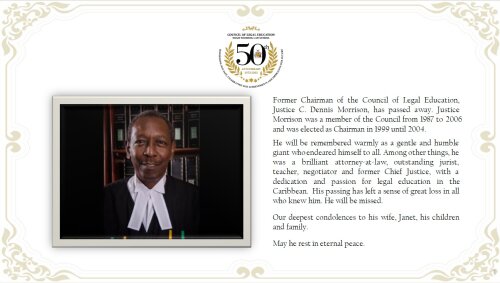Best Drunk Driving Lawyers in Trinidad and Tobago
Share your needs with us, get contacted by law firms.
Free. Takes 2 min.
Or refine your search by selecting a city:
List of the best lawyers in Trinidad and Tobago
About Drunk Driving Law in Trinidad and Tobago:
Drunk driving is a serious offense in Trinidad and Tobago, with strict legal consequences for those caught driving under the influence of alcohol. The legal blood alcohol limit is 35 micrograms of alcohol in 100 milliliters of breath, or 80 milligrams of alcohol in 100 milliliters of blood.
Why You May Need a Lawyer:
You may need a lawyer if you have been charged with drunk driving in Trinidad and Tobago. A lawyer can help you navigate the legal system, protect your rights, and provide expert legal advice on the best course of action to take in your case.
Local Laws Overview:
In Trinidad and Tobago, the penalties for drunk driving can include fines, license suspension, and even imprisonment. The legal system takes a strong stance against drunk driving, and it is essential to seek legal advice if you find yourself facing charges.
Frequently Asked Questions:
1. What is the legal blood alcohol limit in Trinidad and Tobago?
The legal blood alcohol limit is 35 micrograms of alcohol in 100 milliliters of breath, or 80 milligrams of alcohol in 100 milliliters of blood.
2. What are the penalties for drunk driving in Trinidad and Tobago?
Penalties for drunk driving can include fines, license suspension, and imprisonment, depending on the severity of the offense.
3. Can I refuse a breathalyzer test in Trinidad and Tobago?
Refusing a breathalyzer test in Trinidad and Tobago can result in immediate suspension of your driver's license.
4. How can a lawyer help me with my drunk driving case?
A lawyer can provide expert legal advice, represent you in court, and help you navigate the legal process to achieve the best possible outcome for your case.
5. What should I do if I have been charged with drunk driving?
If you have been charged with drunk driving, it is important to seek legal advice immediately to protect your rights and begin building a strong defense for your case.
6. Are there any defenses against drunk driving charges in Trinidad and Tobago?
There are various defenses that a lawyer can use to challenge drunk driving charges, such as improper police procedures or inaccuracies in breathalyzer tests.
7. How long do drunk driving charges stay on my record in Trinidad and Tobago?
Drunk driving charges can stay on your record for several years, depending on the severity of the offense and the legal process involved.
8. What is the legal process for drunk driving cases in Trinidad and Tobago?
The legal process for drunk driving cases typically involves an arrest, booking, court appearance, and potential trial if the case goes to court.
9. Can I represent myself in a drunk driving case in Trinidad and Tobago?
While you have the right to represent yourself in court, it is highly recommended to seek legal advice and representation from a qualified lawyer to ensure the best possible outcome for your case.
10. How can I find a lawyer to help me with my drunk driving case in Trinidad and Tobago?
You can search for lawyers specializing in drunk driving cases in Trinidad and Tobago online, ask for recommendations from friends or family, or contact the Trinidad and Tobago Law Association for a referral to a reputable lawyer.
Additional Resources:
For more information on drunk driving laws and legal resources in Trinidad and Tobago, you can visit the Trinidad and Tobago Police Service website or contact the Ministry of Legal Affairs for guidance.
Next Steps:
If you need legal assistance for a drunk driving case in Trinidad and Tobago, it is crucial to contact a qualified lawyer as soon as possible to protect your rights and receive expert legal advice on the best course of action for your case.
Lawzana helps you find the best lawyers and law firms in Trinidad and Tobago through a curated and pre-screened list of qualified legal professionals. Our platform offers rankings and detailed profiles of attorneys and law firms, allowing you to compare based on practice areas, including Drunk Driving, experience, and client feedback.
Each profile includes a description of the firm's areas of practice, client reviews, team members and partners, year of establishment, spoken languages, office locations, contact information, social media presence, and any published articles or resources. Most firms on our platform speak English and are experienced in both local and international legal matters.
Get a quote from top-rated law firms in Trinidad and Tobago — quickly, securely, and without unnecessary hassle.
Disclaimer:
The information provided on this page is for general informational purposes only and does not constitute legal advice. While we strive to ensure the accuracy and relevance of the content, legal information may change over time, and interpretations of the law can vary. You should always consult with a qualified legal professional for advice specific to your situation.
We disclaim all liability for actions taken or not taken based on the content of this page. If you believe any information is incorrect or outdated, please contact us, and we will review and update it where appropriate.
Browse drunk driving law firms by city in Trinidad and Tobago
Refine your search by selecting a city.











